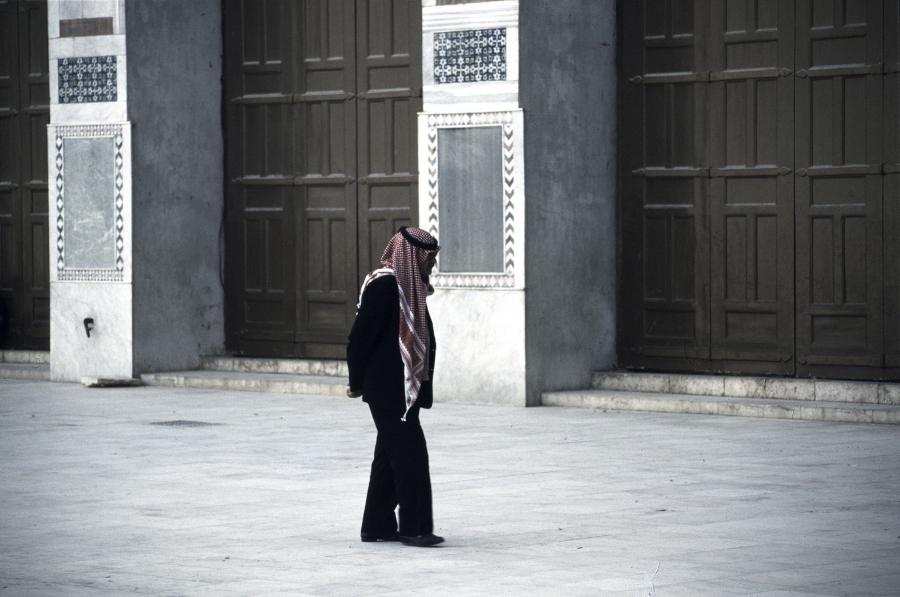Monday 29th November 1993, 8:30am to 11:00am
Just after 8:30am and we are on the coach heading from Bosra towards Damascus. The road is passing through mainly agricultural land, signs of farming are everywhere which I find surprising given the small amount of rain that falls in this part of the country. In the fields we see plenty of agricultural equipment but few people, maybe because it is still early or maybe because the work in these fields is largely complete for the season. We pass many olive groves, some recently planted, others mature.
The guide tells us that the wheat harvest has been particularly good this year, almost twice the annual average. He says the Syrians are trying to be self sufficient and have put many years and much effort into improving their agriculture. I have no reason to doubt him, he seems a straightforward guy, but it is difficult to overcome years of propaganda and I can't help wondering how much of this is true and how much influenced by the official narrative. Self sufficiency sounds good but for a country that has been beset by sanctions is it more a necessity than free choice?
Someone asks the guide about the number of apparently half built but occupied houses we have seen since our arrival into the country. He explains that the custom is for several generations of families to live in one house with each generation adding another storey. The previous generation builds with the reinforced concrete pillars already in place for next next.
"So are all the houses privately owned?" He tries to explain about the state and private sectors. There is a big difference in pay between the two he says but the state tries to ensure that everyone has a decent house and in the cities there is "corporation housing". Families typically pay one third of their income for a "suitable house" until they have bought it. The arrangements are made through workers co-operatives or trade unions. It all sounds like a communist ideal, nice in theory but again I found myself wondering how it works in practice.
As we continue on our journey the guide, an experience archeologist, who speaks three languages, has worked with number of internationally renowned universities and collaborated on several academic papers, explains the Syrian education system. Elementary education (which I think he said was from 6 to 12 years old) is compulsory and free. No one has an excuse not to attend school. Higher education is also free and the students living costs heavily subsidised by the state. I think he says that a subsidised student flat in Damascus costs 90LS (about £1.50) per month. Can that be right? I wonder how it compares with "market rate". But then he continues to explain that there are strings attached.
When students graduate, he tells us, they have to work on low pay in the state sector for five years to "repay" the investment in their education and new doctors are "posted" for two years to a region that may be less popular but needs medics. He says it is so that anyone can go to university and get educated in skills the country needs. It sounds like a good idea but he says that some people, from rich families, are able to buy their way out and move abroad.
The guide pauses to point out that the road we are travelling along goes close to the Occupied Territories of the Golan Heights. He indicates and we can see the mountains from the bus. The sketch map of the region provided by the local tour company for whom the guide is working doesn't show Israel. Few Syrian maps acknowledge Israel, they either leave it unmarked or identify it as Palestine.
I realise I don't know much about Syria and can't reconcile what the guide is saying with my pre-conceived ideas. I am lost between two sets of propaganda. My friends and family were worried when we decided to travel here; why were we going to such a dangerous place full of Arab terrorists? I've seen it isn't full of terrorists, mainly families trying to make a living and look after their kids just like anywhere else, but there is no doubt that it is viewed as a hostile state, aligned to the former Soviet Union and that it is under the thumb of the Assad regime.
Then again, the attitude to Syria has softened a bit recently, or is that just relative to the increased hostility to Iraq and Libyia? Or because Syria was on "the right side" during the recent Gulf War or because of the collapse of the Soviet Union? We are on this trip with an organised, respectable tour company. True we couldn't fly directly into Syria but it must be a sign that relationships are thawing a little.
I give up trying to work out the politics or whether the tour guide is obliged to preach Syrian propaganda and merely wonder how ordinary friendly people can be thought of as bogy men when they are just like anyone else. How can politicians distort the images of their own and others' countries so much. The Assad regime may be unpleasant but these people hardly had free and fair elections so we can't tar them all with the same brush as their government.
The journey is almost over. We are driving through the outskirts of Damascus. We have seen and done so much today and it is not even lunch time yet.
